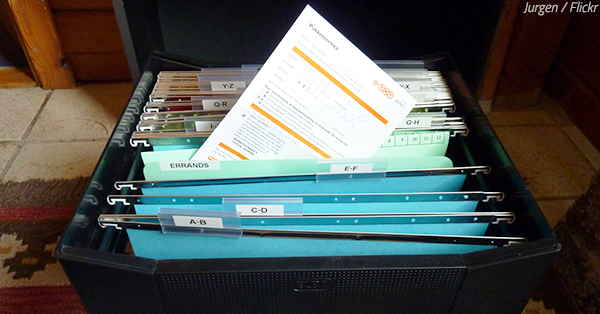 While getting ready to move out, you may happen to neglect a task that may not seem top-priority at first – to collect, sort, organize, pack, and move safely all your personal documents. And yet, it’s still an important thing to do before moving day comes knocking on your door.
While getting ready to move out, you may happen to neglect a task that may not seem top-priority at first – to collect, sort, organize, pack, and move safely all your personal documents. And yet, it’s still an important thing to do before moving day comes knocking on your door.
Do you have any idea what personal documents to take with you to the new home? Whether you answer this with a Yes or a No, you should still need to know how to keep those important documents safe when you move across the country.
Read on to find out what to do with your personal documents during a house move. And more importantly – what important documents to take with you when you move house.
What to do with your documents when moving house
The following 5 steps will show you the best way to deal with all the documents you have in the house during the stressful period of moving to another home.
A house move can be rather chaotic in nature, so you’ve got to be careful not to lose any essential documents in the process. The thing is that it can be really hard to stay perfectly organized when you happen to be worrying about a million things at the same time.
Step 1: Sort out your personal documents
The very first step is to go through all the documents you own and set aside the ones that 1) have expired, 2) are no longer relevant, and 3) you won’t ever need for some reason or another. Product warranties, for example, fall into all 3 categories, so it doesn’t make any sense to keep them any longer.
As you’re sorting out your documents, use extreme caution not to discard a piece of paper that is still perfectly relevant and you’re going to need in the future. When unsure, it’s better to keep the document in question than to throw it away – after all, a few sheets of paper won’t make much difference either way.
A word of caution: Destroy the personal documents you’re not taking with you – either shred them to tiny pieces or burn them. In other words, don’t just throw in the trash documents that contain personal information or sensitive information.
The reason for this precautionary measure is the risk of identity theft – your personal data falling into the wrong hands.
Step 2. Organize the important documents
As you’re going sorting your essential documents, be sure to organize them as well. Below you will find more information about how to do just that, but for now, separate the papers into several different categories:
-

Organize your important documents into different folders for easier access after the move.
personal documents,
- employment documents,
- house documents,
- legal documents,
- financial documents,
- motor vehicle documents,
- medical documents,
- school documents, and
- move-related paperwork.
For your convenience, get several accordion folders that are ideal for storing documents, and use those folders to organize the important documents by using the type of classification that makes the most sense for you.
Step 3. Collect the documents you’re missing
Once you’re done sorting out and organizing the paperwork, think about whether there are any major documents that you’re missing – essential paperwork that you will find much harder to obtain after the move.
Examples of such documents include but are not limited to:
- Medical records and vaccination documentation from the family physician about each member of the family. You’ll need those papers to register with a new doctor in the destination city.
- Vaccination records from a vet in case you’re moving with a pet – a dog, a cat, or a bird. Again, you’ll need to have those documents to find a licensed veterinarian in the new area.
- School records when you’re moving with a school-age child – you’ll need those documents to enroll your son or daughter in a new school after the move is complete.
Interactive & Printable Moving Checklist
Step 4. Backup the most essential documents
The transitional period of moving from one home to another is very uncertain – one of the many reasons why the house moving process is so stressful. Literally, anything can happen during a house move, so it’s always a good idea to be ready for a number of not-so-great relocation scenarios.
Provided that you have enough time, you should seriously consider scanning the most important documents you own and saving digital copies of them on your computer and on an online cloud service as yet another backup of the initial backup.
Another thing you can do is get extra paper photocopies but that’ll only increase the volume of the paperwork you’ll have to move between the two homes, so promptly digitizing your most essential documents still remains the best option for you.
Step 5. Keep your important documents safe during transport
Of course, the most important thing is to keep all essential documents safe during the actual house move. All in all, there are two major principles that you need to follow to do just that:
- KEEP all documents in a safe and secure place – either in several accordion folders (possibly one when you’re moving only a handful of papers) or in a file box designed specifically for transporting documents between various locations.
Another option is to use a file bag – the most convenient way to safely get your critical documentation to the new place. -

Now your personal information is safe.
MOVE all those important documents by yourself regardless of just how trustworthy your movers look. In that case, you should only trust yourself and nobody else. Keep your documents close by at all times and move the document folder, bag, or box with you in your vehicle when driving to the new address.
Remember that trusting a mover with your most important documents is a rookie mistake, so you should never do it. Provided that you’ve hired a good moving company, they themselves should refuse to move your documents because documentation falls into the items that movers are not allowed to pack and move for safety reasons.
How to Find a Reliable Moving Company in 10 Steps
What important documents to take with you when moving
Here’s the complete checklist of important documents to take when you’re moving to a new house altogether. This list of essential documentation to move with you will help you greatly during the paperwork sorting stage when you may not be sure which papers to take and which ones to just discard.
You know where you keep your essential documents in the house, don’t you? Whether it’s a filing cabinet, a document chest, a desk drawer, or even a fireproof safe (in the case of extremely important documents), it’s time to take them all out and prepare them for transport.
Personal documents
Here are the personal documents that you must take with you when moving to another part of the country:
- birth certificates,
- marriage and death certificates,
- civil partnership certificates,
- custody documents,
- divorce and separation documents,
- passports,
- driving licenses,
- visas and immigration documents – when moving to another country,
- diplomas, academic and professional qualifications,
- national insurance cards,
- military records and all related documents.
Work-related documents
Here are the employment documents you will need to move with you:
- copies of work contracts,
- CVs;
- letters of recommendations,
- evaluation reports, and
- various employment documentation.
Property documents
Here are the property-related documents that you have to move on your own:
- property deeds,
- rental agreements,
- rent receipts,
- mortgage documents,
- home insurance policies,
- utility bills,
- home repair receipts and warranties,
- warranties of home products, and
- other property-related documents
Legal documents
Here are some of the legal documents you may need to take with you to the new place:
- wills,
- Power of Attorney documents,
- criminal record certificates, and
- any other legal documents you happen to own.
Financial documents
Here are the financial documents you will have to keep with you whenever the wind of relocation takes you:
- payslips,
- bank transaction statements,
- debit and credit card receipts,
- bank statements and credit card statements,
- investment document,
- tax receipts, and
- other financial documents that you must keep with you.
Motor vehicle documents
Here are the vehicle documents you need to carry with you when driving to the new home:
- car titles,
- proof of purchase documentation,
- vehicle registration certificates,
- car insurance policies,
- credit agreement documents,
- repair contracts and warranty documentation,
- tax receipts.
Medical documents
Here are some of the medical documents you will need to collect before you move out – both from your family physician and the vet:
- health insurance cards,
- immunization records,
- medical insurance documents,
- letters of referrals to specialists,
- veterinary records and vaccination certificates for pets
School documents
These the school documents that you are expected to obtain when you’re moving with school-age children.
- copies of school transcripts,
- grade report cards, and
- evaluation reports.
Move-related documents
Of course, you shouldn’t forget that every house move generates plenty of paperwork as well. These are some of the move-related documents you are to keep safe even when the move is officially over:
- Bill of Lading (your moving contract) with the professional moving company,
- price estimates in writing,
- house inventory sheets,
- extra agreements between you and your mover,
- receipts.
It’s important to bear in mind that due to the house move, you will have to change some of the above-mentioned documents. For example, you will need updated insurance policies for the new home and the car (in order to register it in a new state). Also, you will need to update your voter registration and you may choose to move your bank account as well.
Of course, your home address is changing, and that fact alone will necessitate changes or updates to numerous property-related documents as well.









